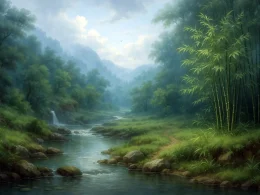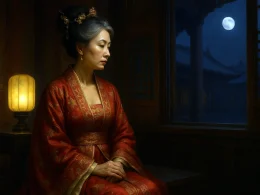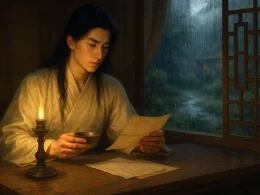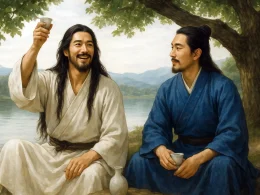When twin oars approach, there appears
A face like Peach Root and Leaf of bygone years.
Her singing fan lightly catches falling blooms,
While moth-eyebrows outshine all other glooms.
Spring fades away, the isle turns green alone,
Added with cuckoos' parting moan.
Ten-li Yangzhou, three-life Du Mu's dream -
Let the past remain as a silent theme.
Again palace candles divide the mist,
But seasons change too fast in sorrow's tryst.
All my sweet thoughts I now confide
To elm pods on the steps outside.
Thousands of willow strands, fine as crows' hide,
Dance like swirling snow by wine cups' side.
I seem to see that westbound pass anew,
Where first from my old friend I withdrew.
Original Poem
「琵琶仙 · 双桨来时」
双桨来时,有人似旧曲桃根桃叶。
歌扇轻约飞花,蛾眉正奇绝。
春渐远,汀洲自绿,更添了几声啼鴂。
十里扬州,三生杜牧,前事休说。又还是宫烛分烟,奈愁里匆匆换时节。
姜夔
都把一襟芳思,与空阶榆荚。
千万缕、藏鸦细柳,为玉尊、起舞回雪。
想见西出阳关,故人初别。
Interpretation
Composed during the Southern Song Dynasty, likely while Jiang Kui resided in Yangzhou or Wuxing, this ci poem uses springtime imagery to explore themes of memory and separation. Through scenes of river islets, cuckoo calls, and falling elm seeds, it blends the wistfulness of fading spring with the ache of parting, creating a melancholic yet restrained aesthetic. The poem flows with natural imagery, embodying Jiang's signature ethereal subtlety.
First Stanza: "双桨来时,有人似旧曲桃根桃叶。歌扇轻约飞花,蛾眉正奇绝。"
Shuāng jiǎng lái shí, yǒu rén sì jiù qǔ Táo Gēn Táo Yè. Gē shàn qīng yuē fēi huā, éméi zhèng qí jué.
As twin oars approach, someone appears
Like Peach Root and Leaf from old ballads—
Her singing fan catches drifting petals,
Those moth-eyebrows peerless in grace.
The poet's encounter with a beauty evokes memories, opening with an allusion to the legendary Peach Root and Leaf sisters (桃根桃叶), blurring past and present.
"春渐远,汀洲自绿,更添了几声啼鴂。十里扬州,三生杜牧,前事休说。"
Chūn jiàn yuǎn, tīng zhōu zì lǜ, gèng tiān le jǐ shēng tí jué. Shí lǐ Yángzhōu, sān shēng Dù Mù, qián shì xiū shuō.
Spring recedes—islets turn jade,
A cuckoo's cry adds sorrow's shade.
Ten-li Yangzhou, Du Mu's three-life dream—
Let's not speak of things that seem.
Transitioning from scenery to emotion, the stanza reveals the poet's unspoken heartache through references to Yangzhou's splendor and Du Mu's (杜牧) legendary romance, now too painful to recall.
Second Stanza: "又还是宫烛分烟,奈愁里匆匆换时节。都把一襟芳思,与空阶榆荚。"
Yòu háishì gōng zhú fēn yān, nài chóu lǐ cōngcōng huàn shíjié. Dōu bǎ yī jīn fāng sī, yǔ kōng jiē yú jiá.
Again palace candles divide the mist,
Yet seasons shift too fast in gloom.
All my springtime longing drifts
To elm seeds on empty steps—doom.
Returning to the present, the poet marks the Cold Food and Qingming festivals ("palace candles dividing mist" refers to the tradition of sharing new fire). The "elm seeds" (榆荚) symbolize fleeting time and unfulfilled yearning.
"千万缕、藏鸦细柳,为玉尊、起舞回雪。想见西出阳关,故人初别。"
Qiān wàn lǚ, cáng yā xì liǔ, wèi yù zūn, qǐ wǔ huí xuě. Xiǎng jiàn xī chū Yángguān, gùrén chū bié.
A thousand willow strands, where crows nest,
Dance like snow over jade wine.
I see us at Yang Pass, westbound—
Our first farewell, forever enshrined.
The stanza closes with willows and crows setting the scene, while the "Yang Pass" (阳关) allusion crystallizes eternal parting sorrow. The memory of that initial separation lingers, as vivid as the swirling willow catkins.
Holistic Appreciation
This lyric poem unfolds like a springtime scroll, painting before our eyes the scene of a riverside spring outing, while beneath its surface flows the poet's quiet lament for bygone years, lost love, and irretrievable emotions. The imagery is richly layered: Peach Root and Peach Leaf (legendary sisters), flying petals like moth eyebrows, cuckoos crying on sandbars, elm seeds whirling in the air, slender willows hiding crows, and the first parting at Yang Pass… These elements combine to create a poetic realm where "scene and emotion merge," and landscapes convey profound feelings.
Jiang Kui excels at infusing subtle melancholy into ethereal diction. The poem contains both admiration for feminine beauty and sentiments of cherishing spring, nostalgia, and the sorrow of separation. Though the emotion is restrained, it permeates every line, reaching its most poignant expression in the verses about "elm seeds on empty steps" and "willows hiding crows"—lines that linger in the mind with haunting resonance.
Artistic Merits
- Allusive Depth with Subtlety: The opening reference to "Peach Root and Peach Leaf" alludes to The Book of Songs, while "west of Yang Pass" echoes the famous farewell song Three Refrains of Yang Pass. These classical touches are woven seamlessly into the poem, enriching its texture without ostentation.
- Fusion of Scene and Sentiment: The first section depicts spring sights that stir inner turmoil; the latter shifts to seasonal transitions—falling leaves, willow tendrils—triggering deep memories. Here, the tangible and intangible intertwine, each reflecting the other.
- Elegant Diction and Musicality: A master of prosody, Jiang Kui crafts rhythms that ebb and flow like a plucked pipa, each word clear and resonant, each phrase brimming with unspoken feeling.
- Subtle Sorrow within Restrained Beauty: The poem is wistful but never maudlin. Its understated brushwork and refined restraint make its emotional depth all the more moving.
Insights
More than a springtime reverie, this poem epitomizes Jiang Kui's signature "ethereal elegance" (清空骚雅). In just a few dozen lines, he interweaves human figures, spring light, seasonal markers, old affections, and parting emotions into an artistic tapestry of "dreaming back to lost places, with love severed by this spring." It teaches us that true artistic beauty often lies not in loud lamentations but in the profound tenderness concealed beneath light strokes. This lyric also reminds us that emotional depth needs no clamor—a soft hum, a single falling petal, or a wisp of willow is enough to stir the soul.
About the poet
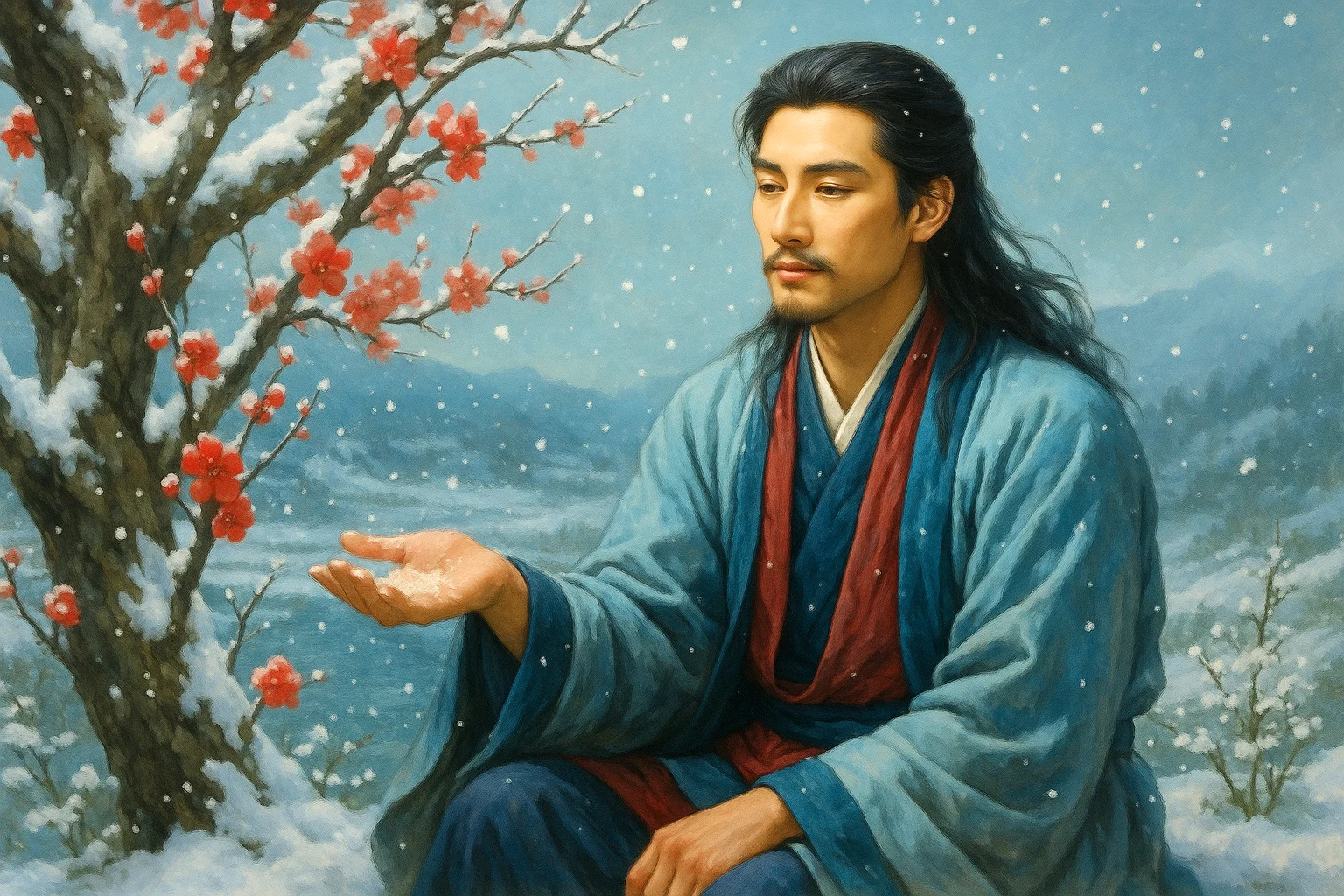
Jiang Kui (姜夔, c. 1155 - 1221), a native of Poyang, Jiangxi, was a Southern Song Dynasty lyric poet and musician. He remained a commoner throughout his life. His lyrics are known for their ethereal and austere style, and his poetry is also highly regarded. Along with Fan Chengda and Yang Wanli, he is celebrated as one of the "Four Great Masters of the Restoration."









